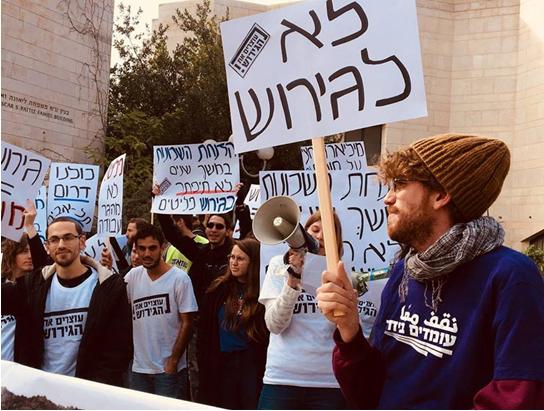Interior Minister Aryeh Deri and Public Security Minister Gilad Erdan announced on Sunday, December 31, that they are launching an “intensive effort” to ensure refugees and asylum seekers leave the country “voluntarily” by imprisoning those who refuse to leave.

“No to deportation!” Students demonstrate against the deportation of refugees last week at the Hebrew University of Jerusalem. Other demonstrations were held at Tel Aviv University, Haifa University and Ben Gurion University of the Negev. (Photo: Standing Together)
The joint ministerial announcement comes in the wake of new legislation passed in December that imposes tough new restrictions on refugees and which ordered the closing down of the Holot detention facility in the Negev by February.
In their joint statement Sunday, Erdan and Deri said the Interior Ministry’s Population and Migration Authority would issue a public statement in the coming days clarifying the options available to the roughly 1,200 migrants currently held at Holot.
The proposal is the latest response by ministers to a Supreme Court ruling from late August that backed Israel’s controversial practice of deporting African refugees to unnamed third countries. According to social activists, Israel tacitly recognizes that Sudanese and Eritreans cannot be returned to their homelands because of the danger that they may face upon their return, so it has signed deals with third countries which agree to accept departing migrants on the condition that the latter consent to the arrangement.
In August, the Supreme Court ruled this third party policy was legal, but also said that Israeli authorities must ensure that the transfer of the migrants to these countries did not inherently pose a threat to their safety. Though Israel has not named the third countries, they have been identified in media reports as Rwanda and Uganda.
However, the Supreme Court also ruled that since the deportations may only be carried out with the explicit agreement of the refugees, refusal to leave Israel cannot be considered uncooperative behavior, and Israel may not imprison refugees who continue in their refusal for more than 60 days. It is not clear how the new policy, once its details are made public on Wednesday, January 3, will fare in the Supreme Court.
Earlier this month, the Knesset approved by a vote of 71 to 41 a plan introduced by Deri and Erdan that sought to increase pressure on the refugees to leave via the government’s voluntary deportation plan to Rwanda and Uganda.
Hadash, the Communist Party of Israel, Joint List MKs, Amnesty International and the UN’s refugee agency, have criticized the government plan. Asylum seekers rights groups in Israel agreed last month the “geographic limits” could effectively deprive the migrants of health and welfare services, as it allowed the interior minister to ban them from Tel Aviv — the only city where those services are provided by the municipality.
Labor chief Avi Gabbay had urged lawmakers from his party to support the bill. Amidst resistance from Labor MKs, he later permitted the lawmakers to vote as they wished. Ultimately some 20 MKs from the Zionist Union (which is made up of the Labor and Hatnua parties) voted against the bill, but Gabbay’s ploy nonetheless drew criticism from other opposition parties.
Gabbay “has forgotten what it means to be Jewish,” Joint List MK Dov Khenin (Hadash) said dryly during a stormy hours-long Knesset debate that preceded the December 11 vote. He was referring to a controversial comment by Gabbay about Israel’s left, which was a paraphrase of the same comment by Prime Minister Benjamin Netanyahu in the 1990s.
“You shall love the stranger! You shall love the stranger! You shall love the stranger! You shall love the stranger!” Khenin shouted in the plenum during the debate, paraphrasing the Biblical verse in Deuteronomy 10:19.
The Population and Immigration Authority says that, as of 2016, more than 40,000 African refugees and asylum seekers are residing in Israel almost all from Eritrea and Sudan. Many live in the poorer neighborhoods of southern Tel Aviv.
Related: Knesset Approves Law to Deport 40,000 Asylum Seekers & Refugees


